








Building Biology is an interdisciplinary science that brings together dynamic and visionary individuals to work for a better, more sustainable, and truly green world.

No other profession so seamlessly integrates the holistic study of the man-made built environment, human health, and ecology. From the German term “Baubiologie,” meaning “building for life,” Building Biology is founded on the principle of balance, using nature as the ultimate guide.
As extraordinary as our modern advances in science and technology may appear, they nonetheless disregard not just our natural environment, but also our human health. Synthetic materials, biological contaminants, and man-made pollutants break down the balance of nature that is essential and sustaining for all life.
Building Biology strives to correct imbalance by implementing materials, methods, and protocols that support a built environment intrinsically aligned with nature.
By understanding and applying the laws of nature to the built environment, Building Biologists are uniquely trained to become solution-oriented leaders and environmental advocates.
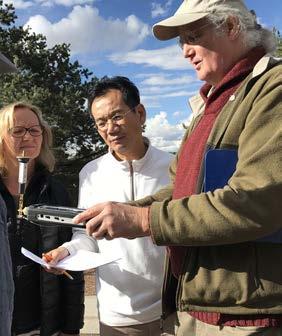
At the Building Biology Institute (BBI), we train our graduates to use the knowledge, tools, and skills they acquire during their course of study to actively assess and find solutions to the problems created from the misuse of chemistry and technology.
We teach our students to approach the built environment from a holistic standpoint, toward the overarching goal of greater harmony and planetary health for current and future generations.
Actively assess and find solutions to the problems created from the misuse of chemistry and technology.
As Building Biologists, we strive to make the built environment healthier for all. Building Biology’s guidelines serve to assure the life-enhancing nature of each dwelling space, with as little disruption to the environment as possible. By setting practical, real-world examples, and sharing solid recommendations based on the fundamental principles of Building Biology, we are making positive change on both an individual and global scale.
The Building Biology Institute’s mission is to help create healthy homes, schools, and workplaces free of toxic indoor air, tap-water pollutants, and hazards posed by electromagnetic radiation. BBI was founded in Clearwater, Florida, 1987, based on the Principles of “Baubiologie,” brought from Germany by the renowned international architect Helmut Ziehe.
Helmut Ziehe, Founder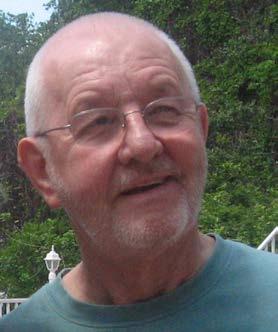
Open to all, from working professionals to the general public, the BBEC program at the Building Biology Institute welcomes students from diverse careers, geographical locations, and educational backgrounds. Our alumni over the years have hailed from seventeen nations outside North America and ranged in age from sixteen to seventy-four.
Our impressive list of alumni includes architects, interior designers, indoor air quality consultants, home inspectors, healthcare practitioners, building science professionals, and home dwellers. We invite anyone who is interested in creating healthier dwellings and a healthier world to join us.

Building Biology Institute does not and shall not discriminate on the basis of race, color, religion (creed), gender, age, gender expression, national origin (ancestry), disability, marital status, sexual orientation, or military status, in any of its activities, events, or operations. We have been and remain committed to providing an inclusive and welcoming environment for all.
We invite anyone who is interested in creating healthier dwellings and a healthier world to join us.
Acheive order and harmony with our surroundings.
Forge a balance between nature, buildings & ourselves. Foster connections for an ecologically oriented world.
Provide a holistic approach to building with occupant wellbeing as the primary focus.
The foundation for certification.
Our BBEC Professional Certification will thoroughly equip students with practical, real-world, hands-on experience in identifying, assessing, and mitigating pollutants, airborne toxins, and electromagnetic emissions in homes, schools, offices, and commercial spaces.

Through our online courses, immersive seminars, interactive discussions, and mentored processes, you can become an expert in the science, methods, and practices that create and maintain ecological and environmentally healthy buildings. You will also become a leader in prevention, certified to advise homeowners, architects, builders, inspectors, engineers, and medical professionals, on best practices for what truly makes a healthy building.
Throughout the BBEC program, we concentrate on teaching the necessary skills needed to take your studies beyond the classroom and into the community. Our students have a drive to impact real and positive change in the world, creating holistically healthy environments and buildings so individuals and communities can thrive. The BBEC program grants a solid educational foundation and platform for you to meet these professional goals.
Many BBI alumni own and manage successful environmental businesses based on their carefully honed Building Biology expertise. Our alumni also include architects, green builders, engineers, building inspectors, medical practitioners, interior designers, and city planners who have used their BBEC certifications to expand their careers and credentials.
IBE 101, our 3 intensive seminars, and our online courses are designed to be taken in any order. We recommend that you take IBE 101: Natural Healthy Buildings before attending your first 5-day seminar.

All required curricula must be completed successfully before a candidate may undertake their BBEC Final Project.
You have up to two years to complete the entire program. Most students complete the entire track within one year. Requests for extensions are considered on an individual basis.
You may pay as you study, enrolling in seminars and courses as your funds allow, or save $1,510 off your entire tuition by paying up front for the full certification track.
Pay In Advance & Save: $5,755*
Pay as You Go: $7,265*
* Tuition includes all online courses, seminars, and final mentored project.
If you are interested in double or triple certification: BBEC, EMRS & BBNC, (a path taken by many of our alumni and students), please reach out to us at outreach@buildingbiologyinstitute.org. Significant tuition discounts are available for students working on multiple certifications.
Building Biology
Environmental Consultant

Electromagetic Radiation Specialist
Building Biology New-Build Consultant
Consider proportion, harmonic measure, order and shape in design.
BUILDING BIOLOGY
We look forward to welcoming you into our international community!
Introducing our courses.

This foundational course addresses the vital interconnections among the built environment, human health, and planetary ecology. It lays a solid groundwork that prepares you to Go Beyond Green™, meeting the urgent call for sustainable dwellings and spaces designed and built with nature as the gold standard.
IBE 101: Natural Healthy Buildings is a mentored, self-study, introductory course to the principles of Building Biology. It is intended to be completed entirely in your home or office, at your convenience. Your mentor will be available to you daily throughout your studies, via phone and e-mail, to assist you in learning how to detect and mitigate, and/ or prevent the many environmental hazards found in homes, offices, schools, and commercial buildings.
Students will learn what kinds of hazards a house or office may contain, how to detect them, what to do about them, and best of all, how not to cause them. This course benefits home dwellers, as well as architects, interior designers and other building professionals.
When you enroll, you will receive the following materials:
• Course Manual
• Study Progress Sheet
• IBE Code Of Ethics (Signature Required)
• Standard Of Building Biology Testing Methods
• Introductory Gaussmeter
• Radon Test Kit
• Water Test Kit
• Prescriptions For A Healthy House
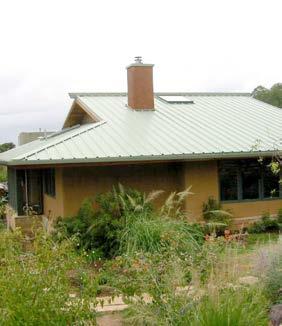
• 7 Steps To Improving Air Quality
• Creating A Sleeping Sanctuary
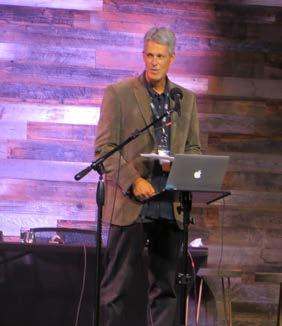
Learn from some of the top indoor environmental professionals, with lively classroom sessions, interactive onsite training, and real-world applications. BBI’s seminar instructors and guest lecturers are some of the leading experts in their respective fields. Our three 5-day immersive seminars offer students the unique opportunity for hands-on learning and networking with colleagues, thought leaders, and skilled environmental experts.
Field trips aren’t just for kids. Take your knowledge outside of the classroom and into the real world. During IBE 213 Building Physics/Building Biology, you will take a field trip with your class to onsite locations for experiential learning by visiting homes built according to Building Biology principles. Trips are guided by certified class instructors.
WINSTON CHURCHILL“We shape our dwellings, and afterwards, our dwellings shape us.”Instructor Rob Metzinger addressing over 300 medical doctors and other healthcare professionals at conference focused on electromagnetic radiation.
BBEC seminars are all held at the beautiful and inspiring IHM Retreat & Conference Center Santa Fe, New Mexico. BBI makes every effort to ensure that the classroom, dining room, commons areas, and overnight guest rooms at the IHM Retreat & Conference Center meet Building Biology Standards for a health-supporting environment. The venue’s management team joins us in our efforts. Check out our venue at www.ihmretreat.com
Meals are prepared by Piñon Catering, served buffet style, and can accommodate nearly all dietary requirements. Foods are healthy, prepared fresh with organic ingredients whenever possible, and delicious.

Ask questions. Get answers. With ample time set aside for questions and discussion, the last morning of each seminar is dedicated to Q&A sessions and an oral review of the course material. Each seminar concludes with a proctored written exam.
Required seminars for Building Biology certification:
IBE 211: Indoor Air & Water Quality
IBE 212: Electromagnetic Radiation
IBE 213: Building Physics/Building Biology
You may attend these seminars in any order.
Students enrolled in BBI’s professional certification tracks (BBNC, BBEC, and/or EMRS) will present their own case study reports as part of the final project toward professional certification.
Read about our seminars, course syllabi, and instructors at buildingbiologyinstitute.org/seminars

On-site dining room serves nutritous meals and seats 75 at a time.
Spacious, comfortable rooms have private baths and radiant heat.
3 daily meals are prepared from scratch, with selections for all dietary requirements.

Indoor air quality (IAQ) is a central focus of Building Biology. Taking a holistic perspective, this seminar focuses on pollutants that are present in our indoor air, tap water, and in building materials, offering students an understanding of the health impacts these myriad pollutants can have upon building occupants. Allergies, immune system suppression, fatigue, nervous system complaints, and many other conditions are triggered or made worse by such substances.
This interactive course teaches students how to inspect, assess, and mitigate a wide range of indoor contaminates. Students are encouraged to explore and implement solutions to improve indoor environmental quality and create healthier buildings. Emphasis is placed on how to identify problems, what their health impacts are, and how to take effective action.
Environmental factors that effect health, including air movement, combustion gases, volatile organic compounds (VOCs), biological contaminants, pesticides, water pollution, dust and particulates, humidity, temperature, and more.

“Happiness lies, first of all, in health.”
GEORGE WILLIAM CURTIS
We are seeing an exponential rise in man-made electromagnetic radiation (EMR) in today’s technologydriven world. From powerlines and cell towers to wireless devices and smart meters, EMR is pervasive in our homes, workplaces, and public spaces. Unfortunately, EMR is also a key environmental factor in contributing to negative health effects.

This course will cover the basic science of electromagnetic fields (EMFs), reviewing terminology, common sources, and the physics of energy. Students will also learn techniques for measuring and mitigating EMR, with particular emphasis on EMR in the bedroom. Practical examples and case studies are presented, with real-world applications. Students “learn by doing” in a lab environment, and introduced to the instruments and procedures for detection, assessment, mitigation, and abatement planning.
When an activity raises threats of harm... precautionary measures should be taken.
THE PRECAUTIONARY PRINCIPLE
Indoor electro-climate environment and the connections between EMFs and human health.
BBI protocols and standards to investigate electro-climate factors, including instrumentation usage, data analysis and solutions, and mitigation methodologies.
Controlling and avoiding EMFs to improve and support the natural health of a building and its occupants.
This 5-day seminar explores the layered connections between human health, the built environment, and planetary ecology. Students will gain vital insights into the dynamic interaction between the climate, the built environment, and the impact of that built environment upon the occupant and the ecosystem.
“The Buildings in which we live, work, and play are designed to protect us from Nature’s extremes, yet they also affect our health and environment in countless ways.”
JÖRN SCHRÖDER, BBECBest practices to create optimal health conditions during construction and/or remodeling and throughout the life cycle of a building.
Available, and often economical, solutions to investigate electro-climate factors, including instrumentation usage, data analysis and solutions, and mitigation methodologies.
Building Physics with human health as the primary focus.
Key facets of Building Physics, including the building envelope, building materials and furnishings, building technologies, and the building system.
Daily schedule includes lectures and group activities, along with practical experience in building science principles, research assignments, demonstrations, and interactive discussions.
Centered around the 25 founding principles of Building Biology, these 16 self-directed home-study courses round off your BBEC education. Subject categories range from site and community design to occupant health and well-being; and from natural and man-made electromagnetic radiation safety to environmental protection and social responsibility.
These online courses offer in-depth topical analysis of the key tenets of Building Biology, enhancing your knowledge and preparing you for professional work in the field. Each course concludes with a required online examination, after which you can download a certificate of completion.
IBE 221.3 Smart Meters
IBE 221.4 5G Cellular Phone Systems
IBE 212.1 Electromagnetic Radiation
IBE 221.4 Electrical Home Wiring
IBE 221.11 Baby Monitors
IBE 222.9 Ventilation
IBE 223.3 Community Planning: Cities in Crisis
IBE 223.4 Community Planning: Exemplary Case Studies
IBE 223.5 Community Planning: Incorporating Building Biology
IBE 223.6 Community Planning: Roadmap For Sustainability
IBE 222.2 IAQ for You
IBE 222.3 Managing Moisture in the Home
IBE 222.4 Vetting Building Materials: Is It Toxic?
IBE 222.5 Water Quality & Treatment Options
IBE 223.2 Light-frame Construction & Health
IBE 223.7 Designing a Kitchen for Wellness
200-Level online courses may be taken in any order.
A Final Project is a practical assignment that brings together all testing protocols, data interpretation, analysis methodologies, home designs, materials, and instruments from your coursework and studies. You will have 3 months from inception to complete and submit your project.

The Final Project is a mentored process. BBI will match you with a senior BBEC who will serve as your mentor, based on your stated goals and your mentor’s established skills.
“Americans, on average, spend approximately 90 percent of their time indoors where the concentrations of some pollutants are often 2 to 5 times higher than typical outdoor concentrations.”
U.S. ENVIRONMENTAL PROTECTION AGENCY
Under your mentor’s close guidance, you will take your comprehensive knowledge and skills directly into the field to perform a home assessment, write a report of your findings, and prove your proficiency in all aspects of the Building Biology Assessment protocol.
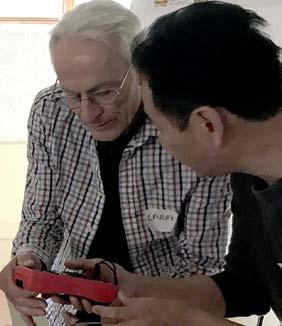
Note: The final project only requires a home assessment, not a mitigation. Should you discover the need for mitigation during your assessment, please reach out to a certified BBEC.
The topics your Final Project explores will include: low and high EMF frequency ranges, including radiofrequency and cellular phone signals, static electric and magnetic fields, volatile organic compounds (VOC’s), pesticides, combustion gases, water pollution, dust and particulates, environmental stressors.
The science of healthy buildings
The Building Biology Institute (BBI) is a 501(c)(3) nonprofit organization dedicated to educating both professionals and the general public about how to create healthy homes, schools, and workplaces.